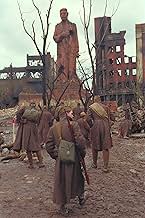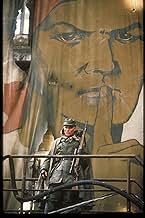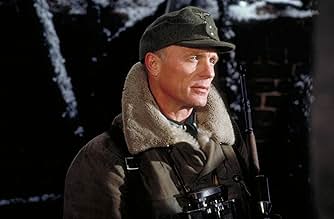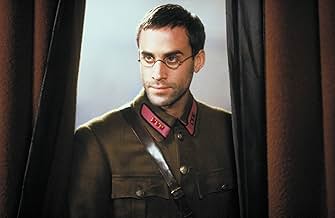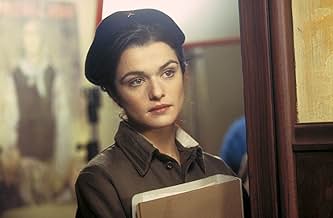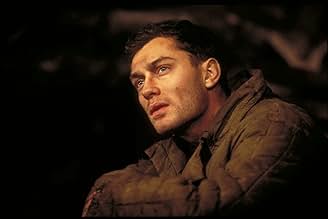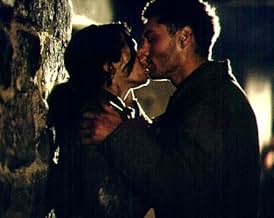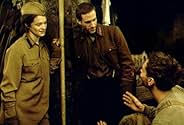Un cecchino russo ed uno tedesco cercano di eliminarsi a vicenda durante l'assedio di Stalingrado.Un cecchino russo ed uno tedesco cercano di eliminarsi a vicenda durante l'assedio di Stalingrado.Un cecchino russo ed uno tedesco cercano di eliminarsi a vicenda durante l'assedio di Stalingrado.
- Regia
- Sceneggiatura
- Star
- Premi
- 7 candidature totali
Gabriel Thomson
- Sacha Filipov
- (as Gabriel Marshall-Thomson)
Hans-Martin Stier
- Red Army General
- (as Hans Martin Stier)
Clemens Schick
- German NCO
- (as Clemans Schick)
Recensioni in evidenza
It's the fall of 1942. Vassili Zaitsev (Jude Law) grew up hunting with his father in the woods. He, Tania (Rachel Weisz) and countless other untrained recruits are brought up to the front at Stalingrad. He and Commisar Danilov (Joseph Fiennes) survive a suicidal charge. Vassili kills 5 Germans in the aftermath and Danilov writes about him. Nikita Khrushchev (Bob Hoskins) seizes the opportunity to make him a star. Opposing him is the aristocratic German sniper Major König (Ed Harris).
The opening is an amazing opera of mass destruction. Then it's a matter of a chess game. It's a fascinating cat and mouse game in the ruins of the city. I'm glad that nobody decided to talk in a fake Russian accent. That would be too distracting. This is a rare good American war movie not about Americans.
The opening is an amazing opera of mass destruction. Then it's a matter of a chess game. It's a fascinating cat and mouse game in the ruins of the city. I'm glad that nobody decided to talk in a fake Russian accent. That would be too distracting. This is a rare good American war movie not about Americans.
If you go into this film hoping for an historically accurate portrayal of the battle of Stalingrad then go watch a documentary, if you are however looking to be entertained by an action packed and gritty WW2 movie set in the city of Stalingrad, then go ahead and pick this up because it's nothing if not entertaining.
The movie is about the real life sniper Vasily Zaitsev played by Jude Law and his exploits during the famous battle, the beginning of the movie is complete chaos as our main hero is sent to the front and we see the besieged and infamous city for the first time. It's honestly worth watching this movie just for the opening scene alone which is just incredibly well done in all aspects and portrays some of the horrors that the soviet troops would have witnessed when arriving there.
Overall this is a highly entertaining war movie, fantastic CGI for the time, everything is well shot, the set pieces are gorgeous and even the acting and characters are well done.
All that said this is of course a Hollywood production, don't expect much in the way of historical accuracy and definitely expect a silly love story (though not the worst) and everyone speaking English with poor Russian and German accents.
The movie is about the real life sniper Vasily Zaitsev played by Jude Law and his exploits during the famous battle, the beginning of the movie is complete chaos as our main hero is sent to the front and we see the besieged and infamous city for the first time. It's honestly worth watching this movie just for the opening scene alone which is just incredibly well done in all aspects and portrays some of the horrors that the soviet troops would have witnessed when arriving there.
Overall this is a highly entertaining war movie, fantastic CGI for the time, everything is well shot, the set pieces are gorgeous and even the acting and characters are well done.
All that said this is of course a Hollywood production, don't expect much in the way of historical accuracy and definitely expect a silly love story (though not the worst) and everyone speaking English with poor Russian and German accents.
First of all, I think it was a mistake for the screenwriters to pick and choose such a big event in the history of WWII, a turning point so to speak, only to have it placed as a background, to something so much less significant, a duel between two snipers. If one has never read anything historical or seen any chronological movies about battle of Stalingrad, or any other battle for that matter before seeing this movie, one might even wonder, how did Russians win the war at all? With one rifle per four hands? Against tanks? And aircraft? And heavy artillery? You know there's only so much even a drunken Russian can do with his ½ of a rifle. I see all these peoples' comments complaining that the main characters' accents were too British or too American and that that spoiled the true Russian Character, however the Hollywood makers portray that to be. But, being Russian myself, I saw nothing in the movie, at least on the Russian side, that resembled any truth to even how people spoke to each other, how they interacted with each other. They just didn't seem Russian to me, and it didn't matter what accents they used. These characters were biased cardboard characters, speaking cardboard character lines, and acting, well, cardboard-like. In the opening scenes of the movie they show a bunch of unarmed people thrown into battle only to be massacred by well armed Germans. That's a crock of sh*t, pardon my Russian. Basically by 1942, Hitler's army was fighting on two fronts, and it was very, very tired. Both sides were. Both sides were running out of people and supplies. Mostly, Battle of Stalingrad was a two-steps-forward-one-step-back kind of war. People charging and taking over some useless strategic point and then being thrown back, and then charging again. It was a battle to see who had a bigger stamina, because both sides were low in numbers. But it was also a battle involving tanks, artillery, and planes on BOTH sides. In the movie they omitted that, showing us diving Stukas, and yet surprisingly, no anti-aircraft guns firing at them, no Russian planes in the sky, just two soldiers armed with one rifle. Bullsh*t. No number of Vasiliy Zaycevs or Tatyana Whoevers would be able to stand off, and more even, reverse the tide of war against Germans, without having, basically an equally, if not better, equipped army at their side. If you look at the numbers, about 250,000 German and about 100,000 Russian soldiers lost their lives over Stalingrad. Well from the movie it might seem the opposite. Plus the whole mood of the movie. Russian soldiers, seemed no different from prisoners, defending Stalingrad only because of the muzzles pointed at their backs. But actually, believe it or not, many of these people were defending their motherland, their wives, daughters, sons, etc. and they were doing it not because they were to be shot otherwise, but because they loved their country and believed in its future. True, there were special NKVD units that were ordered to fire on retreating soldiers. But there was no other way, at that point. If Stalingrad would've fallen, that would greatly demoralize an entire Red Army, and cause an even greater loss of life. But by no means were soldiers thrown into battle, half-armed into their certain death. That would just be pointless, even for ruthless Russian Generals. Plus when they showed Kruschev commanding the front, I fell off my seat laughing. I can go on and on, and this would be a never-ending story, except that I don't want it to be as boring and as never-ending as the script for Enemy at the gates. Advice for people who like a little reality in their movies, don't see it. It sucks. I try to picture Private Ryan done by the same director. It just wouldn't be Private Ryan, but some stupid unrealistic war flick, sort of like U-571.
ENEMY AT THE GATES / (2001) *** (out of four)
By Blake French:
"Enemy At The Gates" takes place in 1942 and details a cat and mouse chase between two snipers. The mouse is a young Russian named Vassili Zaitsev (Jude Law), who arrives on the shores of the Volga River to defend Stalingrad, an important city in which the German's are attempting to capture. Zaitsev soon finds himself befriending a political officer named Danilov (Joseph Fiennes), who is impressed by the soldiers quick skills and decides to glorify him through the local press. Zaitsev becomes a political icon for the locals, giving them encouragement and increasing their hope for victory.
The cat is an opposing sniper named Major Koenig (Ed Harris), a famous sharpshooter called upon to kill Zaitsev. Koulikov (Ron Perlman), another talented sniper, is assigned to help Zaitsev in killing Koenig before the Major takes a victory shot. To further complicate matters, Zaitsev falls in love with another soldier, Tania (Rachel Weisz), whose parents were killed by the enemies, and wants to redeem their honor.
"Enemy At The Gates" certainly paints a vivid, graphic depiction of war. The atmosphere is unsettling and bleak, the characters are almost always dirty and sleepless, the fighting scenes consist of brief, short, instantaneous shots, but the sequences are fast-paced, genuine, and disturbing. The city looks battered and tormented. The dialogue goes hand and hand with the character's actions; the plot is challenging and the movie is focused, about something solid. In the sequences where Koenig and Zaitsev challenge one another, the tension is very effective. The movie tends to realize that, and concentrates a great deal of effort in making those scenes suspenseful and taut.
Joseph Fiennes plays a meek, nervous character and does a good job at bringing him to life believably. Jude Law, whose last work in "The Talented Mr. Ripley" provides a tough act to follow, accomplishes great things with a determined and assiduous character. Ed Harris is the standout actor here, in a harrowing, steadfast, juicy performance. Rachel Weisz cannot do a whole lot with her character, however. She often feels strained and contrived.
"Enemy At The Gates" tries hard to express the subject of the media's influence in our culture. If the film, co-written and directed by Jean-Jaques Annaud ("Seven Years in Tibet"), would have stayed on that concept, it would have been a whole lot better. The romance between Zaitsev and Tania is kind of unnecessary, and I am not sure if the sex scene is obligatory or advances their relationship. This love side story lacks passion; a lot of it feels mechanical and routine. "Enemy At The Gates" is still a consistently intriguing war film-rare because it does not involve Americans. While we are never really concerned about the outcome of the actual war, nor do we entirely care about several aspects of the main characters, there are many good scenes of suspense, and the overall mood of the movie is effective. "Enemy at the Gates" is worth seeing if it sounds interesting to you.
By Blake French:
"Enemy At The Gates" takes place in 1942 and details a cat and mouse chase between two snipers. The mouse is a young Russian named Vassili Zaitsev (Jude Law), who arrives on the shores of the Volga River to defend Stalingrad, an important city in which the German's are attempting to capture. Zaitsev soon finds himself befriending a political officer named Danilov (Joseph Fiennes), who is impressed by the soldiers quick skills and decides to glorify him through the local press. Zaitsev becomes a political icon for the locals, giving them encouragement and increasing their hope for victory.
The cat is an opposing sniper named Major Koenig (Ed Harris), a famous sharpshooter called upon to kill Zaitsev. Koulikov (Ron Perlman), another talented sniper, is assigned to help Zaitsev in killing Koenig before the Major takes a victory shot. To further complicate matters, Zaitsev falls in love with another soldier, Tania (Rachel Weisz), whose parents were killed by the enemies, and wants to redeem their honor.
"Enemy At The Gates" certainly paints a vivid, graphic depiction of war. The atmosphere is unsettling and bleak, the characters are almost always dirty and sleepless, the fighting scenes consist of brief, short, instantaneous shots, but the sequences are fast-paced, genuine, and disturbing. The city looks battered and tormented. The dialogue goes hand and hand with the character's actions; the plot is challenging and the movie is focused, about something solid. In the sequences where Koenig and Zaitsev challenge one another, the tension is very effective. The movie tends to realize that, and concentrates a great deal of effort in making those scenes suspenseful and taut.
Joseph Fiennes plays a meek, nervous character and does a good job at bringing him to life believably. Jude Law, whose last work in "The Talented Mr. Ripley" provides a tough act to follow, accomplishes great things with a determined and assiduous character. Ed Harris is the standout actor here, in a harrowing, steadfast, juicy performance. Rachel Weisz cannot do a whole lot with her character, however. She often feels strained and contrived.
"Enemy At The Gates" tries hard to express the subject of the media's influence in our culture. If the film, co-written and directed by Jean-Jaques Annaud ("Seven Years in Tibet"), would have stayed on that concept, it would have been a whole lot better. The romance between Zaitsev and Tania is kind of unnecessary, and I am not sure if the sex scene is obligatory or advances their relationship. This love side story lacks passion; a lot of it feels mechanical and routine. "Enemy At The Gates" is still a consistently intriguing war film-rare because it does not involve Americans. While we are never really concerned about the outcome of the actual war, nor do we entirely care about several aspects of the main characters, there are many good scenes of suspense, and the overall mood of the movie is effective. "Enemy at the Gates" is worth seeing if it sounds interesting to you.
In "Enemy at the Gates," the future of the greatest battle of World War II, would be decided between a young Russian sniper and an aristocratic sharpshooter from Germany sent to kill him
Jude Law and Ed Harris sit for hours waiting for the right moment
It was a duel set in the siege of Stalingrad
Stalingrad was one of the biggest and bloodiest battles of World War II, and in the midst of this huge battle, these two soldiers were hunting each other down
The film opens with the harrowing transport of thousand of Russian soldiers across the Volga River to Stalingrad The recruits were packed onto steamers, barges, whatever they could find to ferry them across the river All that under a deluge of shells, bombs and explosions
By the time Vassili arrives to Stalingrad, the Nazis have a distinct edge, and Soviet morale is at an all-time low
Leading the Russians in their seemingly futile defense is Nikita Kruschev, played by Bob Hoskins The Germans, at that time, were overrunning the place and the Russians were in an appalling state It was the most awful battle of the war
Joseph Fiennes plays Danilov, an idealistic Russian officer who passionately speaks about his belief in getting the troops to turn the grave situation in Stalingrad around He finds the perfect inspiration in Vassili
Rachel Weisz plays a young woman who volunteers to help in the war effort She's literally protecting the people she grew up with When she meets Vassili, he just has a natural intelligence, a natural instinct
Jude Law is remarkable as the young sharpshooter Vassili Zaitsev who conveyed both humanity and intensity There's such a fierce intelligence and liveliness in his eyes He can also be very quiet and internal Vassili found the complexity within the silence and stillness In fact to be a sniper is very much about a man of action through stillness Vassili represented the ultimate hero, the symbol of someone who could instill hope and belief in victory amongst the troops, because his skills as a sniper were unparalleled
Ed Harris played Major Konig, the German sharpshooter sent to hunt down Vassili He knows that Vassili was picking off German officers with some regularity, and was becoming a folk hero for the Russian soldiers as well as the Russian populace... He decided to eliminate him
The casting of Ed Harris opposite Jude Law resulted in a striking visual link between their characters They both have these unbelievably penetrating blue eyes And director Jean-Jacques Annaud began to see the duel through their eyes And one of the first shots of Ed Harris was a close-up of his blue eyes
Annaud painted the tensions very clearly and concentrated purely on the eyes of the Jude Law and Harris and, of course, on their rifles and how they were hidden and what they were doing Basically, the core of his camera is the duel of their eyes, duel of men, duel of snipers, therefore a confrontation of people that scan the surrounding buildings, and try to decipher what they see
The film opens with the harrowing transport of thousand of Russian soldiers across the Volga River to Stalingrad The recruits were packed onto steamers, barges, whatever they could find to ferry them across the river All that under a deluge of shells, bombs and explosions
By the time Vassili arrives to Stalingrad, the Nazis have a distinct edge, and Soviet morale is at an all-time low
Leading the Russians in their seemingly futile defense is Nikita Kruschev, played by Bob Hoskins The Germans, at that time, were overrunning the place and the Russians were in an appalling state It was the most awful battle of the war
Joseph Fiennes plays Danilov, an idealistic Russian officer who passionately speaks about his belief in getting the troops to turn the grave situation in Stalingrad around He finds the perfect inspiration in Vassili
Rachel Weisz plays a young woman who volunteers to help in the war effort She's literally protecting the people she grew up with When she meets Vassili, he just has a natural intelligence, a natural instinct
Jude Law is remarkable as the young sharpshooter Vassili Zaitsev who conveyed both humanity and intensity There's such a fierce intelligence and liveliness in his eyes He can also be very quiet and internal Vassili found the complexity within the silence and stillness In fact to be a sniper is very much about a man of action through stillness Vassili represented the ultimate hero, the symbol of someone who could instill hope and belief in victory amongst the troops, because his skills as a sniper were unparalleled
Ed Harris played Major Konig, the German sharpshooter sent to hunt down Vassili He knows that Vassili was picking off German officers with some regularity, and was becoming a folk hero for the Russian soldiers as well as the Russian populace... He decided to eliminate him
The casting of Ed Harris opposite Jude Law resulted in a striking visual link between their characters They both have these unbelievably penetrating blue eyes And director Jean-Jacques Annaud began to see the duel through their eyes And one of the first shots of Ed Harris was a close-up of his blue eyes
Annaud painted the tensions very clearly and concentrated purely on the eyes of the Jude Law and Harris and, of course, on their rifles and how they were hidden and what they were doing Basically, the core of his camera is the duel of their eyes, duel of men, duel of snipers, therefore a confrontation of people that scan the surrounding buildings, and try to decipher what they see
Lo sapevi?
- BlooperIn the scene where Vassili is lighting the cigarette butt he picked up from the German sniper, it's apparent by the flame he uses a butane lighter. Butane lighters were not invented until the 1950's.
- Citazioni
Commisar Danilov: I've been such a fool, Vassili. Man will always be a man. There is no new man. We tried so hard to create a society that was equal, where there'd be nothing to envy your neighbour. But there's always something to envy. A smile, a friendship, something you don't have and want to appropriate. In this world, even a Soviet one, there will always be rich and poor. Rich in gifts, poor in gifts. Rich in love, poor in love.
- Curiosità sui creditiThe end credits are slanted and curved.
- Colonne sonoreLa Chanson des Artilleurs
Music by Tikhon Khrennikov
Lyrics by Viktor Gusev
(C) Musikvertag Hans Sikorski, Hamburg
Performed by The Red Army Choir (as Les Choers De L'Armee Rouge)
Courtesy of 7 Productions, Paris
I più visti
Accedi per valutare e creare un elenco di titoli salvati per ottenere consigli personalizzati
- How long is Enemy at the Gates?Powered by Alexa
Dettagli
- Data di uscita
- Paesi di origine
- Siti ufficiali
- Lingue
- Celebre anche come
- Enemigo al acecho
- Luoghi delle riprese
- Aziende produttrici
- Vedi altri crediti dell’azienda su IMDbPro
Botteghino
- Budget
- 68.000.000 USD (previsto)
- Lordo Stati Uniti e Canada
- 51.401.758 USD
- Fine settimana di apertura Stati Uniti e Canada
- 13.810.266 USD
- 18 mar 2001
- Lordo in tutto il mondo
- 96.976.270 USD
- Tempo di esecuzione
- 2h 11min(131 min)
- Colore
- Mix di suoni
- Proporzioni
- 2.35 : 1
Contribuisci a questa pagina
Suggerisci una modifica o aggiungi i contenuti mancanti


